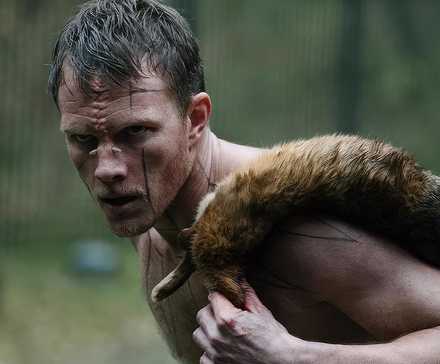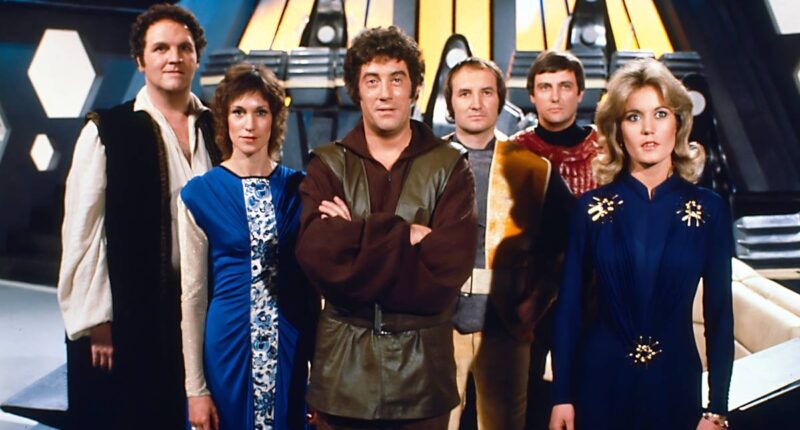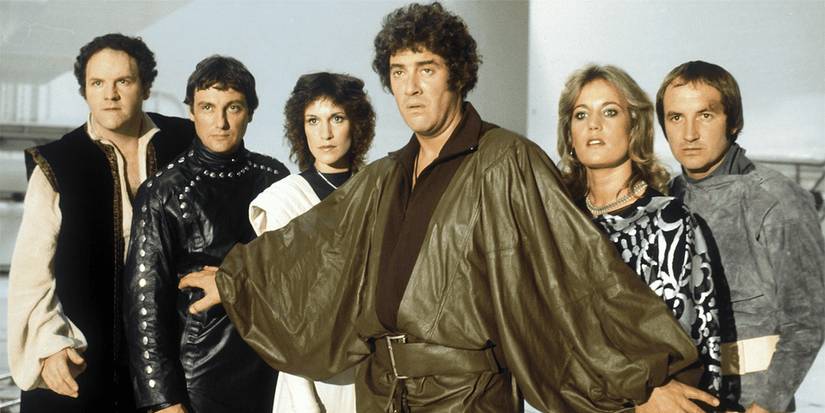If you ask science fiction fans which television series established and advanced the genre, you’ll probably receive a roster of options: The Twilight Zone, Star Trek, The X-Files, Babylon 5, the Battlestar Galactica reboot, and Black Mirror, to name a few. Although those boundary-pushing titles deserve recognition, one masterfully before-its-time gem remains criminally overlooked, despite retaining enough of a loyal following to qualify as a cult classic. Launching on the BBC in 1978 and running for four seasons, Blake’s 7 quietly but firmly revolutionized sci-fi on the small screen. Although creator Terry Nation‘s conceit draws from George Orwell‘s novel 1984 and the Robin Hood mythos, in genre terms, Blake’s 7 dystopian ethos twists Star Trek and Star Wars‘ optimistic structures into their alternative: a brutally incisive and morally gray autopsy on authoritarianism, democracy, and the flesh-and-blood cost of revolution.
Essentially the late ’70s equivalent to Andor, Blake’s 7‘s overarching serialized narrative — a rare endeavor in the days of episodic television — also predates the formula-deconstructing Star Trek: Deep Space Nine, while its misfit ensemble of flawed antiheroes and unlikely revolutionaries anticipates Farscape‘s DNA. To be fair, the through line between Blake’s 7 and its modern counterparts is more coincidental than intentional. Introspective sci-fi always mirrors and predicts the times, and it would’ve cultivated a darker edge without the influence of a low-budget space opera. What’s inarguable is how Blake 7‘s ferocious artistry and cutting-edge audacity forged new ground years before such stark mercilessness became a common fictional refrain.
What Is ‘Blake’s 7’ About?
Several centuries into a future where humanity’s curious space exploration has devolved into rampant colonialism, the Terran Federation rules with an iron fist. The unrepentant fascist regime oppresses its multi-planetary populace by hoarding resources, and it crushes dissent through systematic propaganda, misinformation, brainwashing, assassination, and mass murder. This bleak truth shocks unassuming civilian Roj Blake (Gareth Thomas), but no discovery stuns him more than his true identity. Blake is a living legend, an outspoken public activist and one of the underground resistance movement’s crucial leaders — before the Federation silenced him by executing his family, wiping his memory, and turning him into an obedient cog in their machine, that is.
In an instant, Blake’s safe, normalized world snaps like the fragile spider’s web it is. He’s barely taken a breath before the all-seeing Federation convicts him on false charges and condemns him to a distant penal colony; any stronger humiliation risks triggering the martyr situation they tried to avoid in the first place. Undaunted and freshly radicalized, Blake appeals to his fellow prisoners’ worst natures and convinces them to coordinate a joint escape. Once they commandeer an advanced alien spaceship named the Liberator, the newfound freedom fighters play cat-and-mouse with their mastermind adversaries: Commander Travis (Stephen Greif, Brian Croucher), a revenge-driven hunter in black leather pants and a matching eyepatch, and Supreme Commander Servalan (Jacqueline Pearce), the galaxy’s most lethal woman and its most devastatingly glamorous villain.
‘Blake’s 7’ Is a Politically Complex and Progressive Sci-Fi Dystopia
Don’t let the inconsistent pacing, accidental camp, or penny-level budget fool you (legends claim that the production thrifted costumes from local S&M stores) — Blake’s 7 ventures where few series of the time dare, and does so with acute clarity. The reality of a wartime uprising’s unenviable decisions and de-glamorized consequences swiftly derail Blake’s noble intentions, leading to an aggressively uncomfortable, unrelentingly intense, and startlingly mature tone that mixes space chases, suspenseful heists, and political debates. Characters question whether furthering a righteous cause is worth guerrilla tactics and innocent sacrifices, let alone risking their own skins. Breathless wins and devastating failures take their toll, turning valiant individuals into shells of their former selves. No matter how one determines a successful rebellion, there’s little glory to be found here. Yet as long as they’re breathing, the resistance has a responsibility to fight their seemingly hopeless cause.
These themes are realized by blistering scripts — some profound, some outrageously witty — and an ensemble that’s both divisive and endearing. Surviving an atrocious totalitarian galaxy both creates and encourages Blake’s 7 cowardly, selfish, murderous, and mercenary outlaws. Yet every character, even those who receive less development than their scene-stealing counterparts, is far more complex than they care to reveal (confessing to any softness makes them vulnerable, and vulnerability means death). Those who reform only do so because Blake’s selfless empathy and abiding loyalty inspire their devotion in return. Meanwhile, others who will remain nameless for spoilers’ sake demonstrate progress before regressing to unconscionable degrees. The fact Blake’s 7 defies expectations down to complicating the traditional redemption-is-a-straight-line arc is a disorienting testament to the series’ vision.

This 2-Season 80% RT Sci-Fi Noir Series Is Still One of the Most Criminally Underrated Gems
Get your history books ready!
‘Blake’s 7’s Stellar Ensemble Cast and Groundbreaking Story Pull No Punches
The Liberator‘s crew never quite establishes a found family dynamic. They become a successful unit in spite of themselves, their stellar chemistry, exasperated fondness, and gallows humor routinely interrupted by chaotic power struggles, tension, recklessness, uneasy self-reflection, and glacier-slow descents into paranoia. Besides their fearless leader, notable figures include Jenna Stannis (Sally Knyvette), a formidable smuggler and ace pilot, Kerr Avon (Paul Darrow), a technology expert and a notorious self-preservationist, Vila Restal (Michael Keating), a first-rate thief whose comedic spinelessness obfuscates his intelligence, Cally (Jan Chappell), a humanoid alien with psychic abilities, and Dayna Mellanby (Josette Simon), an unmatched gunslinger on a personal vengeance quest.
Nearly every character’s strengths and weaknesses juxtapose with another’s, especially where the dubious sliding scale of idealism, cynicism, fanaticism, and fatalism is concerned. In that regard, Blake and Avon’s constant push-pull dynamic produces the series’ most thematically rich and chillingly relevant ideological debates. No Blake’s 7 relationship simmers with more contention than these polar opposites. Their incessant challenging and posturing, the emotional chasm separating Blake’s outstretched hand and Avon’s affected disdain, matches the dictionary definition of love-hate; they’re too caught up in their mutual fascination to know the meaning of the word “different,” let alone realize that their passionate clashes have become the other’s anchor in a fragile galaxy.
Maintaining a core group of seven, even when the cast rotates in and out, the ensemble strikes the precise right notes. Thomas’ Shakespearean gravitas, his charisma, and his measured viciousness blend into the exact leading man this narrative needs — a lone warrior who’s convincing enough to inspire an ongoing insurrection and intimidating enough to send the Federation scrambling. The effortlessly elegant and endlessly watchable Pearce turns Servalan into Blake’s (and Avon’s) ideal foil; an arrogant and sadistic genius with an arsenal of manipulative tactics at her disposal, she can entice with a languorous pose, obliterate with a nod of her head, and inspire terror with one sly, serpentine smirk. As for Avon, the series’ runaway star, when the right director or scene partner reigns in Darrow’s tendency for on-the-nose melodrama, he subtly delivers that antihero aura in spades: calculated but unpredictable, intriguingly self-aware, disarmingly vulnerable, and a purveyor of disdainful insults delivered as dryly as dinosaur bones fossilized in Death Valley.
From a daring opening salvo through to a fearlessly grim conclusion that only a handful of modern series can match, Blake’s 7 establishes its stakes and commits to their severity at every turn, refusing to embrace more palatable outcomes. It routinely swaps out the cast, unceremoniously kills fan favorites, and poses punishing questions with no decisive answers. All that said, the series’ intricate worldbuilding, enticing characters, and silly VFX are worth their weight in gold. Its blueprint might not be one of Andor’s direct inspirations, but what subsequent series achieve, Blake’s 7 achieves first — and just shy of best.










